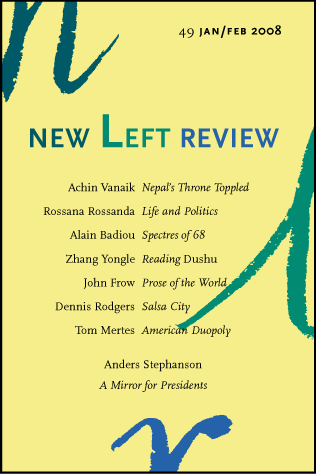For a decade, the monthly review Dushu has published some of China’s most incisive debates on the country’s culture and economy. Zhang Yongle’s survey relates the journal’s trajectory to the PRC’s dramatic development course and ruptures within its intelligentsia.
Why does the spectre of May 68 still haunt French discourse? Alain Badiou on the country’s longue durée sequences of restoration and revolt, and the place of Sarkozy’s presidency within them. Lessons in political courage from Plato and Corneille, and a call to reassert the Manifesto’s founding wager.
The overthrow of the monarchy in Nepal, brought about by a prolonged people’s war and massive popular mobilizations. Achin Vanaik sets out the complex socio-historical backdrop to the Second Democratic Revolution of 2006, the ensuing struggle for a new republic, and the tactical challenges facing the CPN-M.
Memories of war-time resistance work and the political culture of the million-strong PCI in liberated Milan, from one of the founding editors of Il Manifesto. Questions and doubts, in this portrait of an unsentimental education.
Nicaragua’s capital as microcosm for the country’s transformation since the 1970s: shattered by earthquake and the depredations of the Somoza dictatorship, briefly lifted by Sandinista urban reconstruction, remade in the 1990s by narco-traffickers and the returning Miami emigration.
Tom Mertes on Jerry Hough, Changing Party Coalitions. Ethnic and confessional divisions as the origins of America’s political alignments, and the elite strategies that have culminated in today’s red–blue polarization.
John Frow on Franco Moretti, ed, The Novel. Landmark collection of essays tracing the history and geography of the novel, and relations between morphology, themes and social forms.
Anders Stephanson on John Lewis Gaddis, Cold War and Surprise, Security and the American Experience. Diplomatic history as mirror for presidents, with postwar geopolitics recast as morality tale.
